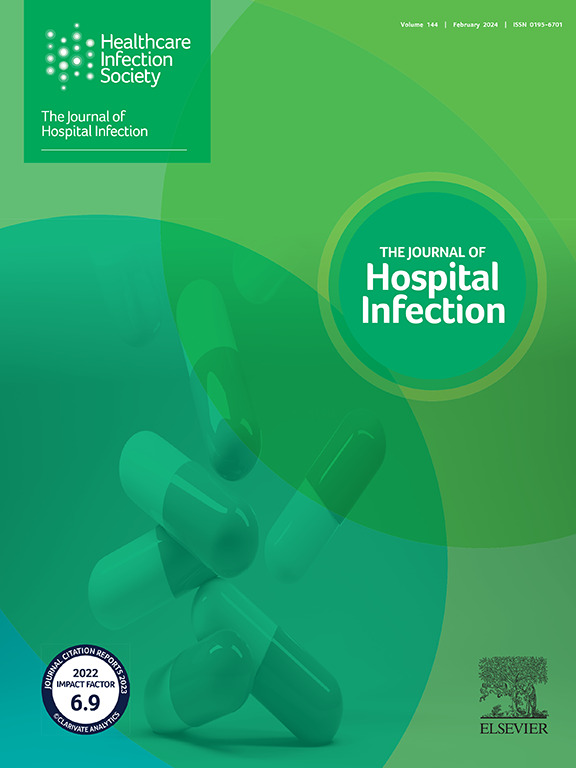医生遵守感染预防措施的决定因素:范围界定审查。
IF 3.1
3区 医学
Q1 INFECTIOUS DISEASES
引用次数: 0
摘要
背景:尽管有证据表明,采取预防感染措施可以减少医护人员相关感染,但这些措施的依从性却很低,尤其是医生。干预效果往往无法持续。目的:确定影响医生感染预防行为的决定因素,探讨提高依从性的策略,以及在这些研究中是否使用了实施科学的理论、模型和框架:范围界定审查方法。我们与一位医学信息专家合作,在 PubMed、Embase、APA PsycInfo 和 Web of Science 中进行了文献检索,时间截至 2023 年 6 月 2 日。所有关注高收入国家医生感染预防行为的研究类型均被纳入。提取了有关决定因素和策略的数据;决定因素按理论领域框架(TDF)进行了分类:我们共纳入了 56 篇文章。发现与 TDF 领域最相关的是 "环境背景和资源"、"社会影响"、"对后果的信念"、"记忆、注意力和决策"、"知识 "和 "技能"。最主要的决定因素涉及到 TDF 之外的一个主题:社会人口因素。可持续的干预措施是多模式方法,至少包括反馈、教育和倡导者。理论、模型和框架很少被用于指导实施战略的制定:本综述概述了医生预防感染行为的决定因素。干预研究很少明确指出其旨在解决的决定因素,也缺乏理论支撑。未来的倡议应将决定因素的知识与实施科学相结合,针对决定因素制定基于理论的干预措施。本文章由计算机程序翻译,如有差异,请以英文原文为准。
Determinants of compliance with infection prevention measures by physicians: a scoping review
Despite evidence that application of infection prevention measures can reduce healthcare-associated infections, compliance with these measures is low, especially among physicians. Intervention effects often do not sustain. An overview of determinants for physicians' infection prevention behaviour and successful behaviour change strategies is lacking. The aim of this review was to identify what determinants influence physicians' infection prevention behaviour, what strategies to improve compliance have been explored, and whether theories, models, and frameworks from implementation science have been used in these studies. A literature search was performed in PubMed, Embase, APA PsycInfo and Web of Science up to June 2nd, 2023, in collaboration with a medical information specialist. All study types focusing on infection prevention behaviour of physicians in high-income countries were included. Data on determinants and strategies was extracted; determinants were categorized into the Theoretical Domains Framework (TDF). Fifty-six articles were included. The TDF domains ‘environmental context and resources’, ‘social influences’, ‘beliefs about consequences’, ‘memory, attention and decision-making’, ‘knowledge’, and ‘skills’ were found most relevant. The prevailing determinant covers a theme outside the TDF: socio-demographic factors. Sustainable interventions are multimodal approaches that at least include feedback, education, and a champion. Theories, models, and frameworks have rarely been used to guide implementation strategy development. In conclusion, it was found that intervention studies rarely specify the determinants that they aim to address and they lack theoretical underpinning. Future initiatives should combine knowledge about determinants with implementation science to develop theory-based interventions tailored to determinants.
求助全文
通过发布文献求助,成功后即可免费获取论文全文。
去求助
来源期刊

Journal of Hospital Infection
医学-传染病学
CiteScore
12.70
自引率
5.80%
发文量
271
审稿时长
19 days
期刊介绍:
The Journal of Hospital Infection is the editorially independent scientific publication of the Healthcare Infection Society. The aim of the Journal is to publish high quality research and information relating to infection prevention and control that is relevant to an international audience.
The Journal welcomes submissions that relate to all aspects of infection prevention and control in healthcare settings. This includes submissions that:
provide new insight into the epidemiology, surveillance, or prevention and control of healthcare-associated infections and antimicrobial resistance in healthcare settings;
provide new insight into cleaning, disinfection and decontamination;
provide new insight into the design of healthcare premises;
describe novel aspects of outbreaks of infection;
throw light on techniques for effective antimicrobial stewardship;
describe novel techniques (laboratory-based or point of care) for the detection of infection or antimicrobial resistance in the healthcare setting, particularly if these can be used to facilitate infection prevention and control;
improve understanding of the motivations of safe healthcare behaviour, or describe techniques for achieving behavioural and cultural change;
improve understanding of the use of IT systems in infection surveillance and prevention and control.
 求助内容:
求助内容: 应助结果提醒方式:
应助结果提醒方式:


